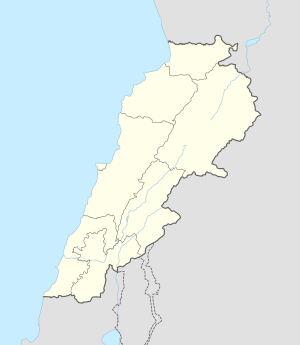Miye ou Miye
|
Miye ou Miye المية ومية |
||
|---|---|---|
| Town | ||
 |
||
|
||
| Location in Lebanon | ||
| Coordinates: 33°32′31″N 35°23′51″E / 33.54194°N 35.39750°ECoordinates: 33°32′31″N 35°23′51″E / 33.54194°N 35.39750°E | ||
| Country |
|
|
| Governorate | South Governorate | |
| District | Sidon District | |
| Government | ||
| • Type | Mayor-council | |
| • Body | Miye ou Miye municipality | |
| • Mayor | Rafaat Saed Abusaba | |
| Area | ||
| • Total | 5.05 km2 (1.95 sq mi) | |
| Highest elevation | 208 m (685 ft) | |
| Lowest elevation | 29 m (95 ft) | |
| Time zone | EET (UTC+2) | |
| • Summer (DST) | EEST (UTC+3) | |
| Dialing code | 00961 (7) Landline | |
| Website | www |
|
Miye ou Miye (Arabic: المية ومية, French: Mîyé ou Mîyé) is a village in southern Lebanon located 5 km (3.2 mi) East of Sidon and 45 km (28 mi) south of the capital Beirut and it overlooks the Mediterranean Sea. The village lies at an average altitude of 156 m (512 ft) above sea level. Miye ou Miyes' surface (with houses built on it) stretches for 230 hectares (2.3 km² - 0.8878 mi²). The village is bordered with a number of villages/towns: East: Qraiyeh, Ain El Delb; West: Sidon; North: Haret Saida; and South: Darb es Sim, Zaghdraiya.
Legend has it there are three possible root words for the name of the town Miye ou Miye:
In a foreign language (English or French), the name of the town is written in so many variations. For example: Mia Mia, Mie Mie, Mieh Mieh, Mieh et Mieh, Mieh w Mieh, Miehw Mieh, Mieh ou Mieh, Miye w Miye, Myah w Myah, Miyeh w Miyeh, al Miyah wa Miyah, MieMie, etc...
Miye ou Miye population prior to the 1985 civil war was around 5000+ inhabitants. Due to the displacement by the civil war, about half the population migrated to Western countries; about quarter resided in the capital, Beirut, and the rest returned and settled in Miye ou Miye. Miye ou Miye has a mixed population of Christians and Muslims. The people of Miye ou Miye are mostly Catholics (85%), with a few Maronites (7%), Protestants (6%), and Baptists (2%). No information is available on the Muslim population, since they are not registered where they live. The population of the town doubles when the immigrants / expatriates return to spend their summer vacations in their ancestral home. Arabic is the official language; English and French are also spoken.
In the 17th century, Miye ou Miye was mostly farmland owned by a number of wealthy families. The families of "Abu Nakad" and "Faddoul" owned half of the land and the state owned the rest. In the 18th century, Christians started to move to the village, and the state encouraged the farmers by giving them land to farm. The farmers in return had to pay back 10% of the crops. In 1875 Victor Guérin found the village to have 400 inhabitants, some Maronites and some Greek Orthodox.
...
Wikipedia


